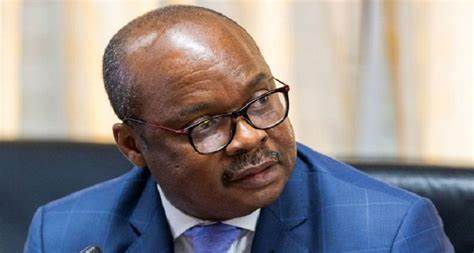
Audio By Carbonatix
The Monetary Policy Committee of the Bank of Ghana has for the second consecutive time increased the Policy Rate – the rate at which it lends to commercial banks by 200 basis points to 19%.
This was announced by the Governor, Dr. Ernest Addison at a press briefing today, May 23, 2022.
The increase in the Central Bank’s monetary policy rate means cost of borrowing is expected to go up at least for the next two and half months.
Prior to the announcement of the Policy Rate, the Central Bank had indicated its intention to tame inflation in order to bring interest rates down and consequently lending rate.
Dr. Addison at a press conference to announce developments in the economy, pointed out that the MPC took the view it needed to decisively address the current inflationary pressures to re-anchor expectations and help foster macroeconomic stability.
He attributed the increment to its latest forecast which shows a continued elevated inflation profile in the near term, with a prolonged horizon for inflation to return to the target band, adding, “inflation expectations by consumers, businesses and the banking sector have also heightened.”
The Governor explained further that “the risks to the inflation outlook are on the upside, and emanate from availability of inputs for food production, imported inflation, continued upward adjustments in ex-pump petroleum prices and transportation costs, possible increases in utility tariffs, and potential wage pressures”.
He stated that “the second-round effects of these administered price adjustments would further amplify inflation pressures in the outlook. These considerations show that with the strong rebound in growth and the closing of the negative output gap, the balance of risk is clearly on inflation.”
Liquidity tightens on the market
Meanwhile, developments in the money market reflected upward trends across the entire spectrum of the yield curve, reinforced by the moderation in liquidity conditions in the various market segments.
From December 2021 to March 2022, the following was observed regarding movements in the rates.
The 91-day and 182-day Treasury bill rates have increased to 16.22% and 16.72% respectively, from 12.49% and 13.19% respectively. The rate on the 364-day instrument also increased to 18.93%, from 16.49%.
Rates on the 2-year, 3-year, and 5-year bonds also went up. On the secondary market, rates on the 6-year, 7-year, 10-year, 15-year, and 20-year bonds all increased.
The weighted average interbank rate increased to 16.46%, from 13.57% in tandem with the 250 basis points policy rate hike in March 2022.
This has also transmitted to the retail-end of the market, and average lending rates have inched up to 21.61% in April 2022, from 20.04% in December 2021.
Latest Stories
-
Police work to restore calm and clear road after fatal tanker crash on Suhum–Nsawam Highway
17 minutes -
Four burnt, several injured in Nsawam-Accra tanker explosion
1 hour -
Police arrest suspect in murder of officer at Zebilla
2 hours -
SUSEC–Abesim and Adomako–Watchman roads set for upgrade in Sunyani
2 hours -
CDD-Ghana calls for national debate on campaign financing
3 hours -
INTERPOL’s decision on Ofori-Atta: What it means for his U.S. bond hearing and the legal road ahead
3 hours -
Parties can use filing fees to cover delegates’ costs, end vote-buying – Barker-Vormawor
3 hours -
Boxing in Bukom: Five months without the bell
3 hours -
Political parties can end vote-buying by disqualifying offenders – Barker-Vormawor
3 hours -
Ministry of Gender investigates alleged sharing of intimate videos by foreign national
4 hours -
Cocoa must be treated as business, not politics- Nana Aduna II
4 hours -
Barker-Vormawor urges scrutiny of COCOBOD reforms, warns of continued debt burden
4 hours -
Prince Adu-Owusu: Beyond flowers and grand gestures — How do you want to be loved?
4 hours -
Multiple vehicles burnt as fuel tanker explodes on Nsawam-Accra highway
5 hours -
Former COCOBOD administration spent syndicated loans on themselves, not farmers – Inusah Fuseini
5 hours

